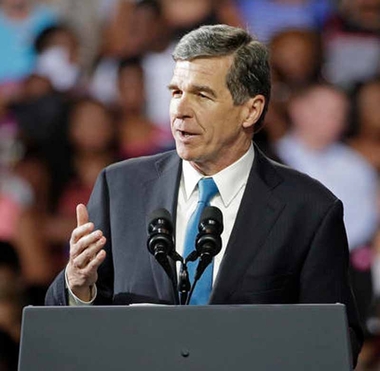Lawmakers won't publicly commit to 'bathroom bill' repeal

Raleigh, N.C. (AP) — North Carolina's governor insists there are enough votes to kill the state's "bathroom bill." But a survey by The Associated Press and eight North Carolina newspapers shows less than a third of lawmakers are willing to publicly commit to that stance.
A closely watched deal to repeal the law fell apart during a December special session amid distrust between Democrats and Republicans. The law known as House Bill 2 sparked backlash from businesses and LGBT advocates who say it's discriminatory because it requires transgender people to use restrooms in many public buildings that correspond to the sex on their birth certificates. It also excludes sexual orientation and gender identity from statewide antidiscrimination protections.
Only 12 of 50 state senators and 40 of 118 current House members said they support abolishing the law, nearly all of them Democrats. On the other side, 13 representatives and six senators said firmly that they want the law to remain.
But the survey doesn't give a clear answer about the likelihood of undoing the law. In both chambers, those giving a "yes" or "no" were outnumbered by those on the fence or declining to participate.
"It's going to be a heavy lift. I hesitate to comment one way or another without seeing a specific proposal," said Republican Rep. Josh Dobson, who represents mountain counties.
About 10 Republicans in each chamber said they were open to finding a solution but would have to see what's included in a repeal bill. The survey was conducted over the opening days of this year's legislative session.
Many Republican lawmakers are likely keeping their views private to discourage public squabbling, said Republican Mike Hager, who served as House Majority Leader before leaving the legislature last year. The House Republican Caucus has been divided over repeal legislation.
Hager also said many GOP legislators from rural, socially conservative areas are torn between concerns about HB2 hampering economic activity and the desire to protect bathroom privacy and respect religious views.
"People have deep-seated feelings about family norms," Hager said. "You've got to have someone brave enough and offer a compromise, because that is what it's going to take."
The survey, sent Jan. 19 by email, asked legislators if they would "vote to repeal House Bill 2 in its entirety" if such legislation were introduced. Reporters also contacted lawmakers by phone or in person over the following week.
Rep. Chuck McGrady, a Republican from mountainous Henderson County, was among those who refused to answer "yes" or "no," saying: "It really depends on what else is with it. If we're talking about a straight repeal and nothing else, I don't know."
Many Republicans say the law is needed to protect safety and privacy, while critics say those dangers are nonexistent.
Democratic Gov. Roy Cooper repeated his assertion that there are enough votes for full repeal in a statement Saturday, saying he has spoken to both Republican and Democratic lawmakers. He urged state Senate leader Phil Berger to allow a simple vote on the law's merits.
"If there ever was a need for bipartisanship, it's now. We came too close in December for Sen. Berger to give up. Too many jobs, too much investment, too much of North Carolina's reputation are at stake," Cooper said.
Berger, responding to the survey, said he has told Cooper that repeal will require compromise and that "I'm encouraged that his response to those concerns is that he wants to work something out." But Berger also told Time Warner Cable News Thursday that he doesn't believe there are enough votes "for an outright repeal without anything else."
Some Republicans said they will not vote for repeal without leaving part of the bathroom provision intact. Others have favored limiting local governments' antidiscrimination measures.
The law was a response to an antidiscrimination ordinance in Charlotte, home to Republican Rep. Andy Dulin. He said he expects lawmakers crafting a repeal bill will be cautious to avoid another showdown with local governments.
"I am of the opinion that we need to let our urban centers and our state move forward," said Dulin, whose district suffered from the withdrawal of the ACC football championship, the NBA All-Star Game and business projects.
By Jonathan Drew And Gary D. Robertson, Associated Press. Copyright 2017 The Associated Press. All rights reserved.
The Gayly – January 29, 2017 @ 7:15 a.m.





